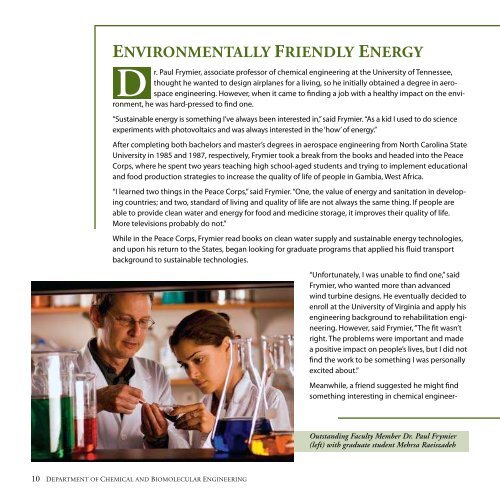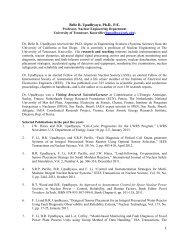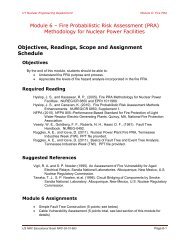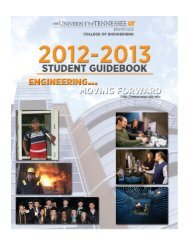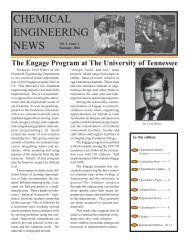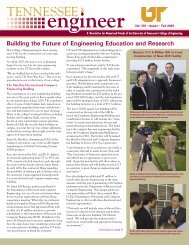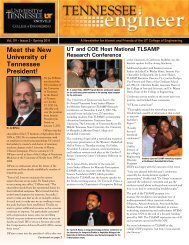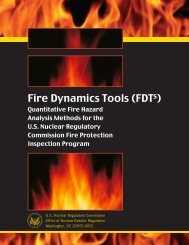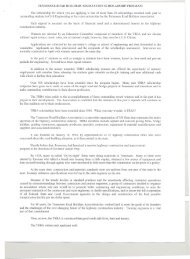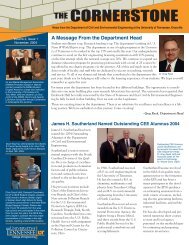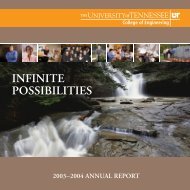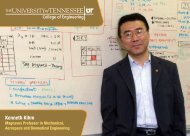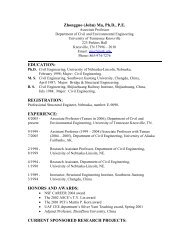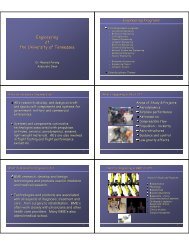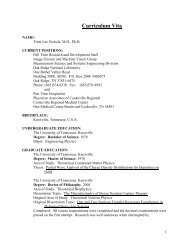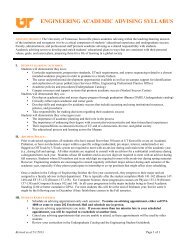CBE 2007 Annual Report - College of Engineering - The University ...
CBE 2007 Annual Report - College of Engineering - The University ...
CBE 2007 Annual Report - College of Engineering - The University ...
Create successful ePaper yourself
Turn your PDF publications into a flip-book with our unique Google optimized e-Paper software.
ENVIRONMENTALLY FRIENDLY ENERGY<br />
D<br />
r. Paul Frymier, associate pr<strong>of</strong>essor <strong>of</strong> chemical engineering at the <strong>University</strong> <strong>of</strong> Tennessee,<br />
thought he wanted to design airplanes for a living, so he initially obtained a degree in aerospace<br />
engineering. However, when it came to finding a job with a healthy impact on the environment,<br />
he was hard-pressed to find one.<br />
“Sustainable energy is something I’ve always been interested in,” said Frymier. “As a kid I used to do science<br />
experiments with photovoltaics and was always interested in the ‘how’ <strong>of</strong> energy.”<br />
After completing both bachelors and master’s degrees in aerospace engineering from North Carolina State<br />
<strong>University</strong> in 1985 and 1987, respectively, Frymier took a break from the books and headed into the Peace<br />
Corps, where he spent two years teaching high school-aged students and trying to implement educational<br />
and food production strategies to increase the quality <strong>of</strong> life <strong>of</strong> people in Gambia, West Africa.<br />
“I learned two things in the Peace Corps,” said Frymier. “One, the value <strong>of</strong> energy and sanitation in developing<br />
countries; and two, standard <strong>of</strong> living and quality <strong>of</strong> life are not always the same thing. If people are<br />
able to provide clean water and energy for food and medicine storage, it improves their quality <strong>of</strong> life.<br />
More televisions probably do not.”<br />
While in the Peace Corps, Frymier read books on clean water supply and sustainable energy technologies,<br />
and upon his return to the States, began looking for graduate programs that applied his fluid transport<br />
background to sustainable technologies.<br />
“Unfortunately, I was unable to find one,” said<br />
Frymier, who wanted more than advanced<br />
wind turbine designs. He eventually decided to<br />
enroll at the <strong>University</strong> <strong>of</strong> Virginia and apply his<br />
engineering background to rehabilitation engineering.<br />
However, said Frymier, “<strong>The</strong> fit wasn’t<br />
right. <strong>The</strong> problems were important and made<br />
a positive impact on people’s lives, but I did not<br />
find the work to be something I was personally<br />
excited about.”<br />
Meanwhile, a friend suggested he might find<br />
something interesting in chemical engineer-<br />
Outstanding Faculty Member Dr. Paul Frymier<br />
(left) with graduate student Mehrsa Raeiszadeh<br />
ing. “Initially I thought to myself, ‘But I haven’t really enjoyed<br />
chemistry’,” said Frymier. Luckily, the graduate program advisor<br />
in chemical engineering appreciated his background<br />
in transport. “A half hour later, I was majoring in chemical<br />
engineering on a full assistantship with a healthy stipend.”<br />
While in the first year <strong>of</strong> his Ph.D program, Frymier earned<br />
a fellowship through the Department <strong>of</strong> Energy to work on<br />
environmental remediation problems.<br />
Frymier graduated from the <strong>University</strong> <strong>of</strong> Virginia in 1995<br />
with a Ph.D. in chemical engineering and a desire to teach.<br />
“Throughout my education and career, faculty are the<br />
people I have most admired,” said Frymier. “I wanted to be a<br />
pr<strong>of</strong>essor rather than a captain <strong>of</strong> industry because I believe<br />
faculty are genuinely interested in their research and want to<br />
solve problems to have a significant impact on people’s lives.<br />
Pr<strong>of</strong>essors are accepted as bona fide experts doing important<br />
work and respected for it. That’s why I chose a teaching<br />
and research career.”<br />
And it seems Frymier found the right fit. Since he has been<br />
part <strong>of</strong> the faculty in the <strong>College</strong> <strong>of</strong> <strong>Engineering</strong>, Frymier has<br />
received the Leon and Nancy Cole Superior Teaching Award,<br />
<strong>2007</strong>; the Departmental Outstanding Teacher Award, 2002,<br />
2004 and 2006; and the Departmental Excellence in Teaching<br />
Award, 2004.<br />
Frymier’s early research at UT focused on two areas: mass<br />
and momentum transport and bacterial adhesion in environmental<br />
and biological systems and toxicity biosensors.<br />
He measured the characteristic properties <strong>of</strong> microbial<br />
interactions with solid surfaces to identify and quantify the<br />
mechanisms involved in the interactions. Simultaneously, he<br />
worked with graduate students to accurately and efficiently<br />
model microbial transport and remediation rates at contaminated<br />
waste sites. In his work on toxicity biosensors, he<br />
developed new hybrid sensor microorganisms and systems<br />
for monitoring aquatic toxicity.<br />
However, the time finally came for him to apply his work at<br />
the interface <strong>of</strong> biology and engineering in the Department<br />
<strong>of</strong> Chemical and Biomolecular <strong>Engineering</strong> to the sustainable<br />
production <strong>of</strong> fuel. He is pursuing this goal through<br />
his work with algae, cyanobacteria and the production <strong>of</strong><br />
hydrogen.<br />
“Since I was a kid tinkering with photovoltaic cells glued to<br />
model cars, I’ve always been interested in alternative energy<br />
sources for transportation,” said Frymier. “When looking for<br />
universities to work at, the thing that piqued my interest<br />
about UT was its close proximity to Oak Ridge National Laboratory<br />
and the on-campus Center for Environmental Biotechnology.<br />
<strong>The</strong> combination <strong>of</strong> campus resources and biological<br />
scientists and engineers coupled with the close relationship<br />
<strong>of</strong> UT and ORNL were major factors in my decision to settle<br />
in Knoxville.”<br />
Currently, Frymier’s research focus is on in vitro (cell-free)<br />
systems for producing hydrogen because lots <strong>of</strong> energy is invested<br />
in sustaining enough live algae to produce hydrogen.<br />
Frymier also concentrates on engineering and optimization<br />
<strong>of</strong> photosynthetic routes to biohydrogen.<br />
Frymier’s children, Fionna Martin, 10, and Gareth Frymier, 8,<br />
remind him <strong>of</strong> the necessity <strong>of</strong> his research.<br />
“<strong>The</strong>re’s a problem I want to be a part <strong>of</strong> solving,” said Frymier.<br />
“I’ve seen the difference in the developing world, and I<br />
want to help out. My kids will be inheriting this planet, and I<br />
want to be part <strong>of</strong> the solution for future generations.”<br />
10 DEPARTMENT OF CHEMICAL AND BIOMOLECULAR ENGINEERING <strong>2007</strong> ANNUAL REPORT 11


